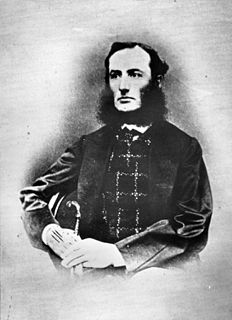Related Research Articles
Shoalhaven was an electoral district for the Legislative Assembly in the Australian state of New South Wales from 1859 to 1904. It included the lower part of the Shoalhaven valley. It replaced parts of Eastern Camden and St Vincent. It was replaced by Allowrie.
Robert Palmer Abbott was a politician and solicitor in colonial New South Wales, a member of both the Legislative Assembly and Legislative Council.

Thomas Garrett was a member of the New South Wales Legislative Assembly, newspaper proprietor and land agent.

John Sutherland was a builder and politician in colonial New South Wales.
Sir Robert Wisdom, was a politician in colonial New South Wales and Attorney General of New South Wales.

John Fitzgerald Burns was an Australian politician, member of the Parliament of New South Wales, Postmaster-General in the 1870s and Colonial Treasurer in the 1880s.

Sir John Lackey was a magistrate and politician in colonial New South Wales, President of the New South Wales Legislative Council 1892 to 1903.

Walter Hussey Vivian was an Australian politician.
John Thomas Gannon was a politician and solicitor in New South Wales, Australia.
Augustus Ryan Fraser was a politician and pastoralist in New South Wales, Australia.
James Rodd was an English-born Australian politician.
John Garrett was an English-born Australian politician.

Abram Orpen Moriarty was an Irish-born Australian politician.
Alexander Campbell was a Scottish-born Australian politician.

Charles Gilbert Heydon was an Australian politician and judge.
A by-election was held for the New South Wales Legislative Assembly electorate of Upper Hunter on 15 April 1861 because of the resignation of John Robertson. Roberston had resigned as Premier on 9 January 1861 to concentrate on the passage of the Robertson Land Acts, which would open up the free selection of Crown land. The bills were passed by the Legislative Assembly on 26 March 1861, and Robertson resigned to be appointed to the Legislative Council to ensure their passage into law.
Shoalhaven, an electoral district of the Legislative Assembly in the Australian state of New South Wales was created in 1859 and abolished in 1904.
A by-election was held for the New South Wales Legislative Assembly electorate of Queanbeyan on 27 January 1881. The election was triggered by the resignation of James Thompson, taking up the government position of Railway Land Valuator.
A by-election was held for the New South Wales Legislative Assembly electorate of Tenterfield on 6 February 1882 because of the resignation of John Dillon, to accept an appointment as senior stipendiary magistrate.
A by-election for the seat of New England in the New South Wales Legislative Assembly was held on 6 January 1871 because of the resignation of Charles Weaver to accept appointment as a police magistrate at Gosford.
References
- ↑ Price, G A. "Garrett, Thomas (1830–1891)". Australian Dictionary of Biography . Melbourne University Press. ISSN 1833-7538 . Retrieved 11 February 2021– via National Centre of Biography, Australian National University.
- ↑ "Mr Thomas Garrett (1830-1891)". Former Members of the Parliament of New South Wales . Retrieved 26 September 2019.
- ↑ "Writ of election: Shoalhaven". New South Wales Government Gazette (185). 26 July 1871. p. 1641. Retrieved 11 February 2021– via Trove.
- ↑ "Appointment of magistrates". New South Wales Government Gazette (190). 1 August 1871. p. 1670. Retrieved 11 February 2021– via Trove.
- ↑ "Shoalhaven election". The Shoalhaven News, Ulladulla and Southern Coast Districts Advertiser . 26 August 1871. p. 2. Retrieved 11 February 2021– via Trove.
- ↑ Green, Antony. "1871 Shoalhaven by-election". New South Wales Election Results 1856-2007. Parliament of New South Wales . Retrieved 11 February 2021.